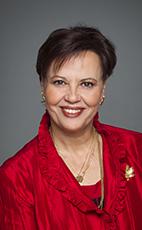Madam Speaker, I do not wish to thank my colleague who just spoke because he had me in tears before I even began my speech.
I would like to begin by extending my deepest condolences to His Majesty King Charles III and the entire royal family, the Princess Royal, the Duke of York, the Earl of Wessex and all of the grandchildren and great-grandchildren. This is a very deep loss for the family, a tragedy that affects them all, and they are top of mind as I speak today.
Much of what was said by my colleague from Lanark—Frontenac—Kingston reflects my own thoughts. He put into words many of my feelings about Her Majesty and her long, successful life, which she so incredibly dedicated to the service of others. Her Majesty was very generous with her time, her talents and, most importantly, her humanity. What I will remember most about Her Majesty is the humanity she always showed.
She was a woman who inspired others through her actions. She did not make many speeches and, as we know, she never gave interviews. She inspired others with her actions, which spoke for themselves.
First, in 1952, she took on a huge responsibility following the tragic loss of her father. Young as she was, she assumed this role with great resolve. Sir Winston Churchill was her first prime minister, and he clearly helped her learn about her role and responsibilities. Over the years, she was able to assert her view of the role and the duties she had to fulfill. In that regard, she was an amazing role model for women who were beginning to come into their own in the post-war years and take their place in society in the hope of coming ever closer to gender equality.
My whole life, I was inspired by everything Her Majesty was able to convey through actions rather than words. She was a woman who knew how to use symbolism in a very subtle but eloquent way. I admire her deeply.
I especially admire her for her visit to Ireland in 2011. It was the first time a British monarch had visited the Republic of Ireland since independence. The strained relationship between the Republic of Ireland, Northern Ireland and the United Kingdom is common knowledge, but it was important to the Queen that the visit be carried out in a spirit of reconciliation between Catholics and Protestants in order to achieve peace at last and reconcile the entire island of Ireland.
I have heard the speeches that have been made both in Ireland and Northern Ireland since Her Majesty's passing, and I am extremely moved to see the extraordinary impact her visit had on relations between the north, the south and the republic. It was courageous of Her Majesty to take that trip and say a few words in Gaelic. That was the olive branch the Irish had been waiting for for so long.
On a lighter note, I want to mention one event that was particularly important during her reign as Queen of Canada. That was the opening of the St. Lawrence Seaway, which occurred in April 1959 in the town of Saint-Lambert, in the riding I represent.
The St. Lawrence Seaway was key to Canada's development, and Her Majesty's presence at its inauguration was a testament to its importance. My constituents treasure the happy memory of that visit.
As an animal lover myself, I want to speak to Her Majesty's affection for her dogs, her corgis, and for horses. Everyone knew how much she loved animals and what great joy they brought her. Her relationship with her dogs was particularly delightful to see.
People saw she was most relaxed when she had the dogs around her or when she was around horses. I absolutely think we should not forget those lighter sides of Her Majesty because they helped her be the human Queen we so loved. We will remember that for a very long time.
The principle of constitutional monarchy has always resonated with me. Our Queen strengthened that significantly.
For the past 44 years, I have had the good fortune to live in Canada and, for all those years, I have had the good fortune to have Queen Elizabeth II as my sovereign. I was not born a Canadian, but I became one and swore my allegiance to the Queen. I now swear my allegiance to His Majesty King Charles III, who became King of Canada on September 8. Our King is exceptionally well prepared for the role he will take on in the coming years.
I would echo the previous speaker in saying that we wish him a very long reign informed by all the experience he has acquired over the years, particularly in two areas in which Canada is working very hard: the climate emergency and reconciliation with indigenous peoples. I think His Majesty has a very good understanding of the policies Canada wants to implement in those two areas. I wish to reiterate my allegiance to him as he begins his reign.
I want to conclude with some words I shared when we celebrated the Platinum Jubilee this past February. Over the course of her 70 years as Queen, she remained steadfast in her reign over a society that is constantly evolving, which I think is quite notable.
Her Majesty honoured her engagement to a life of service like few others. My admiration for her, her steadfastness, as well as her capacity to meet the times is boundless.
May Her Majesty rest in peace. Long live the King.

